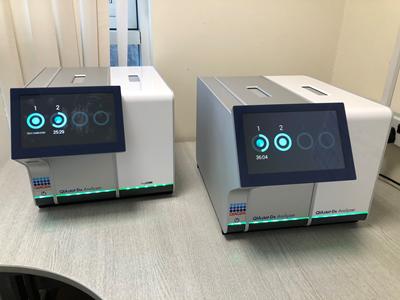Point of Care COVID-19 tests can reduce transmission in hospitals

Southampton-led research has shown that implementing point of care testing in hospitals to rapidly diagnose COVID-19 in patients is achievable and could be brought in ahead of a second wave of the disease.
Management of the COVID-19 pandemic has been hampered by delays associated with the standard PCR test which requires samples to be sent to a laboratory, with results not being available for several hours to several days later. This leads to poor patient flow as patients are held in assessment areas waiting for their results and increases the risk of transmission if negative patients are exposed to patients with COVID-19.
A team of researchers from University of Southampton and University Hospital Southampton used the QIAstat-Dx Respiratory SARS-CoV-2 Panel to test 500 patients admitted with COVID-19 symptoms during the first wave of the pandemic. A similar number of patients were also tested using the standard PCR laboratory test.
The results, published in the journal Lancet Respiratory Medicine, showed that the point of care test was able to provide accurate results for patients in an average of time of around 100 minutes, compared to nearly 24 hours for patients tested with the laboratory test. As a result, patients tested with the point of care test could be moved on to the right ward for them nearly four times more quickly than those tested though laboratory PCR testing.
The trial was led by Dr Tristan Clark, Associate Professor and Honorary Consultant in Infectious Diseases at the University of Southampton and University Hospital Southampton. He said: “Our trial has shown that point of care testing for COVID-19 is feasible and is accurate and reliable. Point of care tests have major benefits over laboratory tests that would help hospitals control infections, allowing them to move patients who test positive to COVID-19 wards much faster.”
The QIAstat-Dx test involves taking nasal and throat swabs from patients which are then mixed with a liquid transport medium to inactivate the virus. The liquid is then placed into a cartridge which is inserted into an analyser machine to providing a rapid ‘sample to answer’ process. It is one of several CE marked point-of-care tests available and was also shown in this trial to be more accurate than the laboratory PCR test that was most commonly used at the time.
Patients who were diagnosed at point of care could also be enrolled into treatment trials, such as the national RECOVERY platform and the Southampton based Interferon Beta trial, much faster –on average 2 days faster than those diagnosed using laboratory tests.
“These testing systems are available now and could be rolled out across NHS trusts in preparation for winter when the second wave of the virusis highly likely to occur.” Dr Clark concluded.